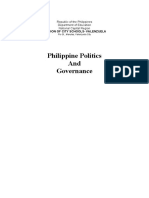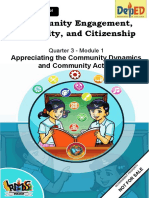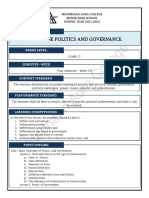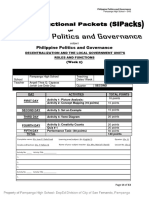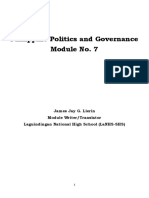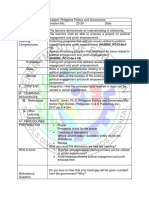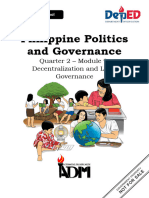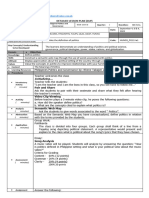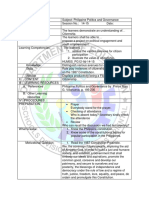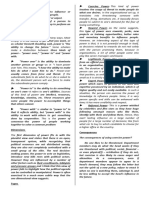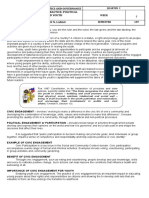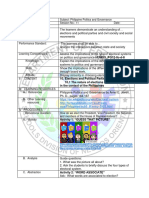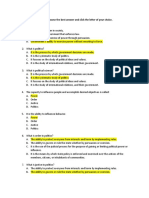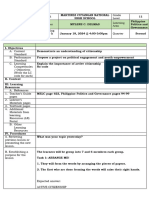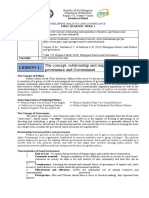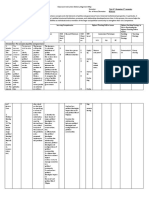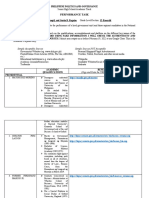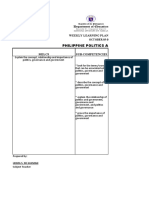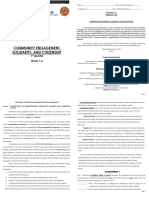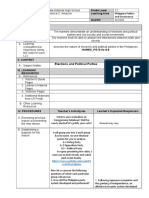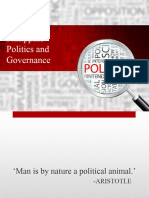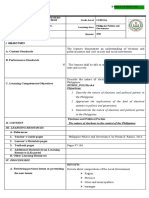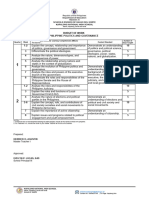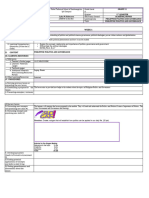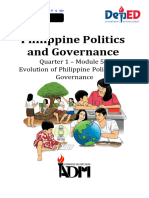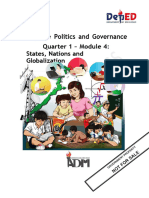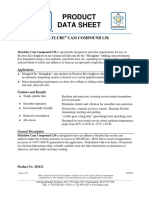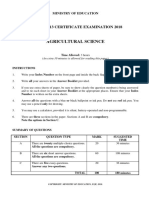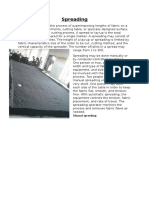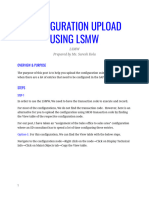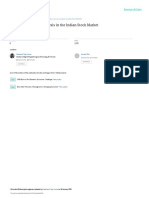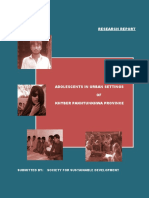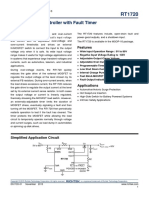Senior
High
School
Philippine Politics and Governance
Quarter 1 – Module
3: Power
i
�PHILIPPINE POLITICS AND GOVERNANCE - GRADE 11 / 12
Alternative Delivery Mode
Quarter 1: Module 3: Power
First Edition, 2020
Republic Act 8293, section 176 states that: No copyright shall subsist in any work of the
Government of the Philippines. However, prior approval of the government agency or office wherein
the work is created shall be necessary for exploitation of such work for profit. Such agency or office
may, among other things, impose as a condition the payment of royalties.
Borrowed materials (i.e., songs, stories, poems, pictures, photos, brand names, trademarks, etc.)
included in this module are owned by their respective copyright holders. Every effort has been exerted
to locate and seek permission to use these materials from their respective copyright owners. The
publisher and authors do not represent nor claim ownership over them.
Published by the Department of Education, Division of Palawan School
Division Superintendent:
Natividad P. Bayubay, CESO VI Assistant
Schools Division Superintendents:
Loida P. Olavario, Ph.D. Felix
M. Famaran
Development Team of the Module
Writers: Archie M. Cascara
Content Editor: Leo Andrew B. Diego
Language Editor: Kristine Hemor
Reviewers: Pedro J. Dandal
Management Team: Natividad P. Bayubay, CESO VI
Loida P. Olavario, Ph. D
Felix M. Famaran Aurelia
B. Marquez Rodgie S.
Demalinao Pedro J.
Dandal
Printed in the Philippines by
Department of Education – MIMAROPA Region
Office Address: 5th Floor Mabini Building, DepEd Complex, Meralco, Avenue, Pasig
City, Philippines 1600
Telefax: (02) 634-1054 o 634-1072
E-mail Address: palawan@deped.gov.ph
www.depedpalawan.com
ii
� Senior High School
Philippine Politics and
Governance
Quarter 1 – Module 3:
Power
iii
�Introductory Message
For the facilitator:
Welcome to the Philippine Politics and Governance module – Analyze the
nature, dimension/types, and consequences of power.
This module was collaboratively designed, developed and reviewed by
educators both from public and private institutions to assist you, the teacher
or facilitator in helping the learners meet the standards set by the K to 12
Curriculum while overcoming their personal, social, and economic
constraints in schooling.
This learning resources hope to engage the learners into guided and
independent learning activities at their own pace and time. Furthermore,
this also aims to help learners acquire the needed 21st century skills while
taking consideration their needs and circumstances.
In addition to the material in the main text, you will also see this box in the
body of the module:
Notes to the Teacher
This contains helpful tips or strategies that will
help you in guiding the learners.
As a facilitator, you are expected to orient the learners on how to use this
module. You also need to keep track of the learners’ progress while allowing
them to manage their own learning. Furthermore, you are expected to
encourage and assist the learners as they do the tasks included in the
iv
�module.
v
�For the learner:
Welcome to the Philippine Politics and Governance – Analyze the nature,
dimensions/types, and consequences of power.
This module was designed to provide you with fun and meaningful
opportunities for guided and independent learning at your own pace and time.
You will be enabled to process the contents of the learning resource while
being an active learner.
This module has the following parts and corresponding icons:
What I Need to This will give you an idea of the skills or
Know competencies you are expected to learn in
the module.
This part includes an activity that aims to
check what you already know about the
What I Know
lesson to take. If you get all the answers
correct (100%), you may decide to skip
this module.
This is a brief drill or review to help you
What’s In link the current lesson with the previous
one.
In this portion, the new lesson will be
introduced to you in various ways; a
What’s New
story, a song, a poem, a problem opener,
an activity or a situation.
This section provides a brief discussion
What is It of the lesson. This aims to help you
discover and understand new concepts
and skills.
This comprises activities for
independent practice to solidify your
What’s More understanding and skills of the topic.
You may check the answers to the
exercises using the Answer Key at the
end of the module.
vi
�What I Have This includes questions or blank
Learned sentence/paragraph to be filled in to
vii
� process what you learned from the
lesson.
This section provides an activity which
will help you transfer your new
What I Can Do
knowledge or skill into real life situations
or concerns.
This is a task which aims to evaluate
Assessment your level of mastery in achieving the
learning competency.
Additional In this portion, another activity will be
Activities given to you to enrich your knowledge or
skill of the lesson learned.
This contains answers to all activities in
Answer Key the module.
At the end of this module you will also find:
References This is a list of all sources used in
developing this module.
The following are some reminders in using this module:
1. Use the module with care. Do not put unnecessary mark/s on any part of the module.
Use a separate sheet of paper in answering the exercises.
2. Don’t forget to answer What I Know before moving on to the other activities
included in the module.
3. Read the instruction carefully before doing each task.
4. Observe honesty and integrity in doing the tasks and checking your answers.
5. Finish the task at hand before proceeding to the next.
6. Return this module to your teacher/facilitator once you are through with it.
If you encounter any difficulty in answering the tasks in this module, do not hesitate to
consult your teacher or facilitator. Always bear in mind that you are not alone.
We hope that through this material, you will experience meaningful learning and gain
deep understanding of the relevant competencies. You can do it!
viii
� What I Need to Know
This module was designed and written with you in mind. It is here to help you master
analyze the nature, dimension/types, and consequences of power. The scope of this
module permits it to be used in many different learning situations. The language used
recognizes the diverse vocabulary level of students. The lessons are arranged to follow
the standard sequence of the course. But the order in which you read them can be changed
to correspond with the textbook you are now using.
This lesson contains the clarity of identification of specific political phenomenon.
Learning Competencies:
1. Analyze the nature, dimensions/types, and consequences of power.
(HUMSS_PG12-Ib-c-6)
After this lesson you are expected to:
2. define and identify the nature, different dimension/types and consequences of power;
3. formulate set of rules for power that leads to the development of self and
promote positive moral implication or consequences.
1
� What I Know
Pre-Test
Multiple Choice
Directions: Choose the letter of the best answer. Write the chosen letter on a separate sheet
of paper.
1. It is the probability that one actor within a social relationship will be in a position to
carry out his own will despite resistance, regardless of the basis on which this
probability rest.
A. Power C. Force
B. Politics D. Governance
2. This power comes from the belief that a person has the formal right to make demands,
and expect others to be compliant and obedient.
A. Latent C. Reward
B. Physical Power D. Legitimate
3. Physical power is best defined as .
A. A power derived from the material or physical advantage.
B. A power to overthrow government.
C. A power to move someone to work for you.
D. A power to overshadow the master.
4. The power one person has over another depends largely on thing such as the expertise
of one person to another and the hierarchical level of one relative to the other.
A. Dynamic C. Relative
B. Perceive D. Latent
2
�5. This power is derived from knowledge. For example: If I know your weaknesses I
could leverage this knowledge when trying to persuade you.
A. Physical power C. Emotional power
B. Information power D. Power
6. This type of power is the result of a person’s perceived attractiveness,
worthiness and right to others’ respect.
A. Referent C. Informational
B. Coercive D. Reward
7. Power relationships evolve over time as individuals gain or lose certain types of power
relative to others.
A. Relative C. Latent
B. Perceive D. Dynamic
8. It refers to the most likely outcome when coercive power is used by leader.
A. Compliance C. Commitment
B. Resistance D. Service
9. This type of power results from a person’s ability to control the information that others
need to accomplish something.
A. Informational C. Emotional
B. Referent D. Physical
10. This type of power comes from the belief that a person can punish others for
noncompliance.
A. Legitimate C. Dynamic
B. Compliance D. Coercive
3
� Module Analyze the nature,
dimensions/types and
3 consequences of power
Nowadays many people have always this negative impression on power. For them,
power tends to corrupt people especially in politics, that is, that negative notion of corruption
is always associated by their being politicians. This negative notion on power embedded from
their lack of understanding on the nature, dimension/types, and consequences of power. If
you are one of them, now it is time to explore the concept of power.
What’s In
Activity 1: Jumbled Ideology
Directions: Rearrange the words to find the correct answer below:
1. LIERALISMB
2. VATMISRESCON
3. ISMCASF
4. CISOALISM
5. MISCHRANA
Guide question:
1. How is power portrayed in different ideologies?
4
� What’s New
Activity 2: Power Qoutes:
Directions:Read each of the quotes. Then give each quote a truth rating. Provide a
short explanation of why you rated each quote the way you did.
1. “Power tends to corrupt and absolute power corrupt absolutely.”
-Lord Acton
The quote above is…
1 2 3 4 5
Never true Seldom true Sometimes Often True Always true
true
Explaination:
2. “It is not power that corrupts but fear. Fear of losing power
corrupts those who wield it and fear of the scourge of power
corrupts those who are subject to it.”
-Aung San Suu Kyi
The quote above is…
1 2 3 4 5
Never true Seldom true Sometimes Often True Always true
true
Explaination:
3. “When the power of love overcomes the love of power, the world
will know peace.”
-Jimi Hendrix
The quote above is…
1 2 3 4 5
Never true Seldom true Sometimes Often True Always true
true
5
�Explaination:
4. “There is no power for change greater than a community
discovering what it cares about.”
-Margaret J. Wheatly
The quote above is…
1 2 3 4 5
Never true Seldom true Sometimes Often True Always true
true
Explaination:
5. “Political power grows out of the barrel of a gun.”
-Mao Zedong
The quote above is…
1 2 3 4 5
Never true Seldom true Sometimes Often True Always true
true
Explaination:
Guide Questions:
1. From the power quotes mentioned, which of them do you feel is most true
about your own life?
2. Based on your observation, how do leaders exercise their power to get
citizens to act a certain way.
6
� What Is It
Nature, dimension/types, and consequences of power
What is Power?
Power is - It is the probability that one actor within a social relationship will be in a position
to carry out his own will despite resistance, regardless of the basis on which this
probability rest (Weber, 1947).
- It is among other thing, the ability to enforce one’s moral claims (Gouldner, 1970).
-The ability to make a difference, to change things from what they would otherwise
have been (Giddens, 1997)
NATURE
1. Latent – Power is something that people have and may not choose to use.
2. Relative – The power one person has over another depends largely on thing such as
the expertise of one person to another and the hierarchical level of one relative to the
other.
3. Perceive – Power is based on one person’s belief that another has certain
characteristics.
4. Dynamic – Power relationships evolve over time as individuals gain or lose certain
types of power relative to others.
TYPES
5 types of POWER identified by John R.P. French and Bertram Raven in 1959, here as
follows:
1. Legitimate – This comes from the belief that a person has the formal right to make
demands, and expect others to be compliant and obedient.
2. Reward – This results from one person’s ability to compensate another for
compliance.
3. Expert – This is based on a person’s high levels of skill and knowledge.
4. Coercive – this comes from the belief that a person can punish others for
noncompliance.
7
� 5. Referent – This is the result of a person’s perceived attractiveness, worthiness and
right to others’ respect.
Bertram Raven added an extra Power in 1965:
6. Informational – This result from a person’s ability to control the information that
others need to accomplish something.
DIMENSION
1. Physical Power – power derived from the material or physical advantage.
Individually, it can come from strength or skill, such as the power of physical strength
of an athlete.
2. Information Power – this is derived from knowledge. For example: If I know your
weaknesses I could leverage this knowledge when trying to persuade you.
Power often comes from the control of access to information, where you can permit
or offer access to others.
3. Emotional Power – this is the social power of affect, using emotion to get what you
want. Charisma is a form of emotional power, including the power of oratory and the
use of subtle body language.
CONSEQUENCES
1. Compliance – It is the state of being too willing to conform to the request, more
likely, if it is perceived to be within the leader’s scope of authority.
It is also the state of being too willing to do what other people want.
Reward and legitimate powers are most likely to produce compliance.
2. Commitment – It is an even more desirable outcome because of the trust and
emotional pledge that it engender.
Commitment is most likely when the powers used are expert and referential
3. Resistance – Is the most likely outcome when coercive power is used by leader.
Avoid using coercion except when absolutely necessary, because it is difficult to use
and it is likely to result in undesirable side effects such as anxiety and resentment.
8
� What’s More
Activity 3: Quote of the day!
Directions: Create your own quote about your impression of power in your own life.
”
[Your Name]
Guide Question:
1. As a Senior High School student, how do you show or influence others the right way to
exercise power?
9
� What I Have Learned
1. Today, I learned that…
2. The topic that is NOT clear to me is/are…
3. I want to explore further on…
10
� What I Can Do
Activity 4: DO’S and DON’TS!
Directions: Go back to the activity 2: Power Qoutes then formulate and list 5 DO’S
and DON’TS you can do with power stipulated from the quotes that bring
about development on yourself as a citizen of this country.
DO’S DON’TS
1.
1.
2.
2.
3.
3.
4.
4.
5.
5.
11
� Assessment
How are you? I hope you enjoyed the lesson 1. Okay let’s see how much youhave learned.
Write your answer on your test notebook.
TRUE OR FALSE
Directions: Read the statements carefully. Write T if the statement is correct and write
F if the statement is false.
1. Physical power does not derive from the material or physical advantage. Individually,
it can come from strength or skill, such as the power of physical strength of an athlete.
2. Power is not among other thing, the ability to enforce one’s moral claims.
3. Resistance is the most likely outcome when coercive power is used by leader.
4. Legitimate power is a type of power that comes from the belief that a person has the
formal right to make demands, and expect others to be compliant and obedient.
5. Commitment is most likely when the powers used are expert and referential.
6. Informational power results from a person’s incompetence to control the
information that others need to accomplish something.
7. Expert power is a type of power based on a person’s low levels of skill and
knowledge.
8. Charisma is not a form of emotional power, including the power of oratory and the
use of subtle body language.
9. Coercive power comes from the belief that a person can punish others for
noncompliance.
10. Compliance is the state of being too willing to conform to the request, more likely, if
it is perceived to be within the leader’s scope of authority.
Congratulations! You did a great job! Rest and relax for a while then wait for the next module.
Good luck!
12
� Additional Activities
Activity 5: Essay is not Easy!
Directions: Create a short essay presenting and discussing the facts and your critical
analysis on the nature, dimensions, types, and consequences of power.
13
�14
�References
French, J. R. P., Jr., & Raven, B. (1959). The Bases of Social Power. In studies in Social
Power, D. Cartwright, Ed., pp. 150-167. Ann Arbor, MI: Institute of Social Science
Research.
Giddens, A. (1997). Sociology. 3rd . ed Cambridge: Polity Press, 1997. Gouldner, A.
(1970). The Coming Crisis of Western Sociology. New York: Avon.
Raven, B. H. (1965). Social influence and power. In I.D. Steiner & M. Fishbein (Eds.),
Current studies in social psychology (pp. 371-382) New York: Holt, Rinehart,
winston.
Weber, M. (1947). The theory of social and economic organization. From Wirtschaf
und Gesellschaft translated by Talcott Parsons. New York: The Free Press.
15
�16
